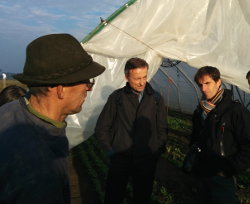Position of accompaniment
Subjectivist paradigm approaches :

They respect the individual evolutions of each learner and avoid the temptation of complying with institutional knowledge.
The skill remains intimately linked to the person. We propose two models for training :
(1) one which favours an individual connection with the environment through sensitive, sensorial and imaginary approaches;
(2) the other which aims at helping the learner in his/her evolution by accompanying him/her in solving a problem.
Resources
Sensitive approach :
- @ Workshop of observation practices, heightening senses and awareness of the importance of senses as learning factors/mediators.
To create a situation-problem :
From a problem or a professionnal situation to analyse :
- @ Group for the analysis of practices (GAP)
- @ Role play
- @ Theatre forum
To work from a problem of participants to research solution :
- @ Project accelerator
- @ Problem tree
To use case study :
- @ Analyse the situation of the case study and to demonstrate to the others what they saw
How to listen, to observe, to feel, to talk... :
- @ Senior advisor accompanies junior advisor on field visit :
Furthering your discovery of training itinerary :
@ Position of trainer as an expert or objectivist paradigm@ Position of trainer as a facilitator or socio-critical paradigm
@ Combining different positions
@ How to evaluate integration
@ Exploring agroecological knowledge

